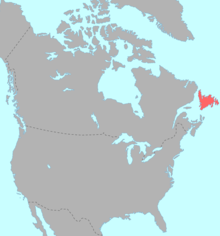Beothuk language
| Beothuk | |
|---|---|
| Beothukan | |
| Native to | Canada |
| Region | Newfoundland |
| Ethnicity | Beothuk people |
| Extinct | 1829, with the death of Shanawdithit (Nancy April) |
|
unclassified | |
| Language codes | |
| ISO 639-3 |
bue |
Linguist list |
bue |
| Glottolog |
beot1247[1] |
|
Pre-contact distribution of Beothuk language | |
The Beothuk language (/biːˈɒtək/ or /ˈbeɪ.əθʊk/), also called Beothukan, was spoken by the indigenous Beothuk people of Newfoundland. The Beothuk have been extinct since 1829 and there are few written accounts of their language, so little is known about it.
Beothuk is known only from four word lists written down in the 18th and 19th centuries. They contain more than 400 words but no examples of connected speech. However, a lack of any systematic or consistent representation of the vocabulary in the wordlists makes it daunting to establish what the sound system of Beothuk was, and words listed separately on the lists may be the same word transcribed in sundry ways. Moreover, the lists are known to have many mistakes. This, along with the lack of connected speech leaves little upon which to build any reconstruction of Beothuk. Claims of links with the neighbouring Algonquian language family date back at least to Robert Latham in 1862; from 1968 onwards John Hewson has put forth evidence of sound correspondences and shared morphology with Proto-Algonquian and other better-documented Algonquian languages, though if valid Beothuk would be an extremely divergent member of the family.[2] Other researchers claimed that proposed similarities are more likely the result of borrowing rather than cognates.[3] The limited and poor nature of the documentation means there is not enough evidence to draw strong conclusions.[4] Owing of this overall lack of meaningful evidence, Ives Goddard and Lyle Campbell claim that any connections between Beothuk and Algonquian are unknown and likely unknowable.[5]
In 1910 American anthropologist Frank Speck recorded a seventy-five-year-old native woman named Santu Toney singing a song purported to be in the Beothuk language. The recording resurfaced at the very end of the twentieth century. Some sources give the year 1929, but the 1910 date is confirmed in Speck's book Beothuk and Micmac (New York 1922, p. 67). The words are hard to hear and not understood. Santu said she had been taught the song by her father (which may be evidence that one person with a Beothuk connection was alive after the death of Shanawdithit in 1829, given Santu Toney was born about 1835). Contemporary researchers have tried to make a transcription of the song along with hoping to clean up the recording with modern methods. Native groups have learned the song.[6]
Mr. James P. Howley, Director of the Geological Survey of Newfoundland, who for more than forty years was interested in the history of the Beothuk, doubted (in 1914) the truthfulness of Santu Toney.[7]
References
- ↑ Nordhoff, Sebastian; Hammarström, Harald; Forkel, Robert; Haspelmath, Martin, eds. (2013). "Beothuk". Glottolog. Leipzig: Max Planck Institute for Evolutionary Anthropology.
- ↑ Hewson, John ((1971) pp 244-249 http://www.jstor.org/stable/1264516). "Beothuk Consonant Correspondences". International Journal of American Linguistics Vol. 37, No. 4. line feed character in
|work=at position 47 (help); Check date values in:|date=(help) - ↑ Voegelin, C.F.; Voegelin, E.W. (1946). "Linguistic considerations of northeastern North America". In Johnson, F. Man in Northeastern North America. Andover, MA: Philip's Academy. pp. 178–194.
- ↑ Mithun, Marianne (2001). The Languages of Native North America (First paperback ed.). Cambridge, United Kingdom: Cambridge University Press. p. 368. ISBN 0-521-23228-7.
- ↑ Campbell, Lyle (1997). American Indian Languages: The Historical Linguistics of Native America. Oxford University Press. p. 290. ISBN 0-19-509427-1.
- ↑ Perry, SJ (2008-09-10). "Santu’s Song: Memorable day for Beothuk Interpretation Centre". Porte Pilot. Retrieved 2010-01-13.
- ↑ Santu’s Song | Hewson | Newfoundland and Labrador Studies
External links
- Text including Beothuk vocabulary
- About the Beothuk language
- OLAC resources in and about the Beothuk language
| ||||||||||||||||||||||||||||||||||||||||||||||||||||
